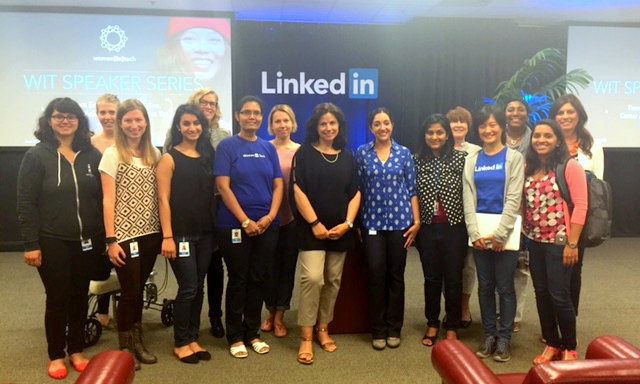WIT Speaker Series Presents Nora Denzel: From Engineer to Executive, Career Advice Hacks from the Top
July 2, 2015
As a recent college graduate working at my first job, I am always looking for opportunities to grow and learn from others by networking and seeking mentors. I am fortunate that LinkedIn has a nourishing culture that invests in the personal and professional growth of its employees beyond their day-to-day responsibilities.
I am a committee member of LinkedIn’s Women In Tech (WIT) Empower team, which hosts workshops and speaker series to provide attendees with insights and actionable takeaways that can directly make an impact on their lives. As an aspiring leader, I am fortunate to be a part of WIT at LinkedIn, which has provided me numerous opportunities to connect with leaders, both external and internal, and engage in career and life conversations in a supportive and trusting setting.
Last week, we welcomed well-known Silicon Valley Leader, Nora Denzel as the first presenter in our WIT Speaker Series. Nora graciously took us on a candid and honest walk down memory lane, reflecting on her journey from engineer to executive, now serving as CEO, angel investor and company board member. We had a broad spectrum of LinkedIn attendees, from those at the early stages of their careers to engineering managers and senior professionals.

Each of us was able to walk away with five concrete ‘career hacks’ that Nora personally uses and recommends we incorporate into our own journeys to reach our personal career ‘tops’.
I am a committee member of LinkedIn’s Women In Tech (WIT) Empower team, which hosts workshops and speaker series to provide attendees with insights and actionable takeaways that can directly make an impact on their lives. As an aspiring leader, I am fortunate to be a part of WIT at LinkedIn, which has provided me numerous opportunities to connect with leaders, both external and internal, and engage in career and life conversations in a supportive and trusting setting.
Last week, we welcomed well-known Silicon Valley Leader, Nora Denzel as the first presenter in our WIT Speaker Series. Nora graciously took us on a candid and honest walk down memory lane, reflecting on her journey from engineer to executive, now serving as CEO, angel investor and company board member. We had a broad spectrum of LinkedIn attendees, from those at the early stages of their careers to engineering managers and senior professionals.

Each of us was able to walk away with five concrete ‘career hacks’ that Nora personally uses and recommends we incorporate into our own journeys to reach our personal career ‘tops’.
- Your career is not a ladder or a line in any form—it is an obstacle course.
We’re all familiar with the overly used metaphor that our careers are some type of ladder or other vector-like object. But in practice, it is clear that there is no such straight line and unequivocally guaranteed path to the top. Instead, Nora suggests we view our careers as an obstacle course in which we must climb our way to the top. This means accepting the fact that at times, we must bend, pause, and sometimes even fall before we come out successful.
- It’s not what you know or whom you know but who knows what you know.
Networking is key to advancement in any career, but how you network and what others know about you is crucial to effective networking. Have a one-liner introduction ready whenever you meet someone that leaves them knowing what you do and more importantly, what you could do for them. Be clear about what you want, especially with your manager, so that whenever an opportunity arises that aligns with your interests and skills, they immediately think of you and help make it happen.
- There is no such thing as a bad boss—you are the boss of your own career.
People often say they have a bad boss that has no interest in their development, growth or future. If your situation is such that your boss fundamentally disconnects with and dislikes you and shows no interest in ensuring you get valuable opportunities, the advice is to get out fast. But for most people who are unhappy with the mentorship and educational guidance they seek from their bosses, the advice is to take matters into your own hands. Be your own boss and don’t be limited by anyone else. Attend networking events, seek outside mentors (perhaps someone else’s boss), and take online courses. Only you can control your education, the self -talk in your head, and the number of hours in your day. Bosses are temporary and can change at any moment, but you are always in charge of yourself.
- Failure is not the opposite of success—it’s an integral part of it.
Fail early and fail often. Figure out what you can learn from your failures and move on. Don’t let the failures defeat you but use them as learning experiences to grow from and never repeat again. When asked, don’t try to hide the failures or twist them to sound like compliments. Instead, embrace them and talk about them openly in a way that acknowledges that they happened but demonstrates how you moved forward in a positive way.
- Be honest.
Advice we’ve all grown up learning from our parents, with a twist. Be honest and have integrity, but know when to stop talking. At times, you may be low in confidence and may have self-doubt, but don’t express all your concerns to the point that your boss and coworkers lose faith in your abilities and eventually stop looking to you for certain assignments. Especially when it comes to talking to people at senior levels, learn to talk in a pyramid. Disclose as little as possible but be sure you know all the details in case they ask you follow-up questions.